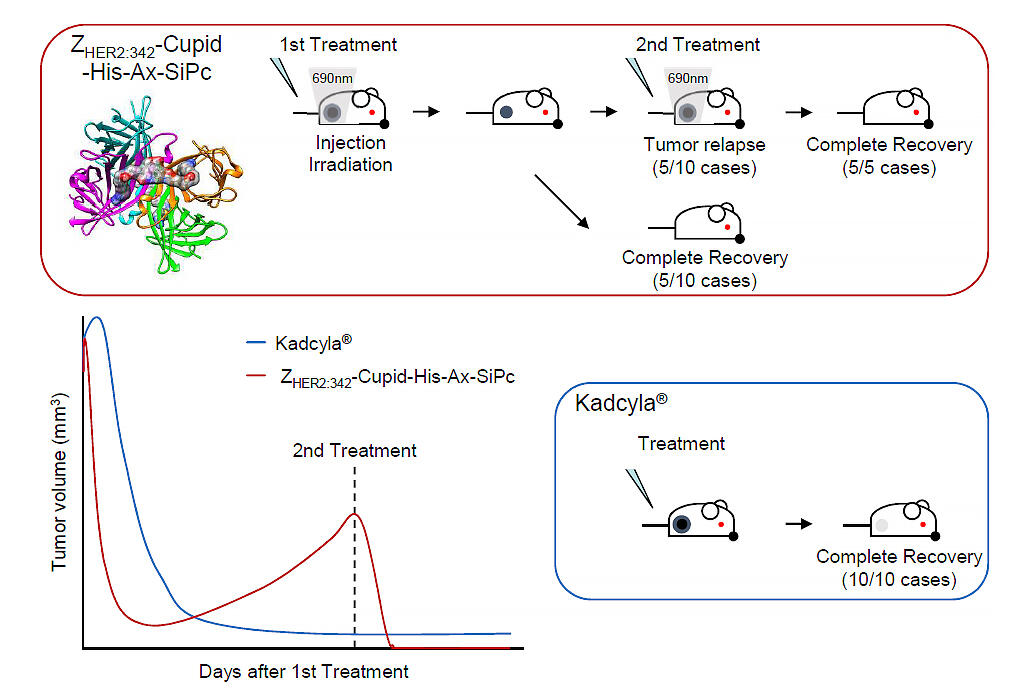A research group led by Assistant Professor Akira Sugiyama of the Isotope Science Center, the University of Tokyo, and Savid Therapeutics, Inc. (CEO: Masanobu Tsukagoshi) announced today that they have developed a therapeutic candidate drug, FL2, that combines a "mimetic drug," an artificially synthesized protein mimicking an antibody, and a new compound, Ax-SiPc, which produces singlet oxygen when irradiated by near infrared light, which they claim has completely eliminated breast cancer in mice. Half of the tumors recurred after one round of the treatment, but when a second dose of the same treatment was given to the recurrent tumors, the tumors disappeared in all mice. The research group also confirmed that immune system cells accumulated in the tissue where the tumor had disappeared. The results are expected to lead to the development of treatments for a wide range of advanced cancers, and were published in Cancer Science.

Pathological complete remission of relapsed tumor by photo-activating antibody-mimetic drug conjugate treatment. CC by 4.0
Although advances in treatment technology have improved outcomes for early-stage cancers, the number of deaths from advanced cancers with recurrence or metastasis is increasing due to the growing number of elderly cancer patients. Cancer is generally treated with surgery, chemotherapy, and radiation therapy, but these treatments are invasive and difficult to use on the elderly, so the need to develop treatments that minimize damage to normal cells and tissues still exists.
In January, Assistant Professor Sugiyama and Professor Emeritus Tatsuhiko Kodama (Cancer and Metabolism Project leader at the Research Center for Advanced Science and Technology, the University of Tokyo) succeeded in developing a stable production method for an "antibody-mimetic" that specifically binds to various molecular targets. The drug was combined with a compound that is activated by near-infrared light (690 nm), and the research group confirmed high therapeutic efficacy in mice by irradiating them with near-infrared light.
In this study, the research group improved the structure of the "antibody-mimetic" with higher manufacturing efficiency, developed "Ax-SiPc," which generates more singlet oxygen when irradiated with light, and developed the therapeutic drug "FL2" by combining the two molecules.
10 mice with a tumor mass (about 400 ml3) of human breast cancer cells implanted subcutaneously were treated with FL2 and irradiated with near-infrared light. After doing so, the tumors shrank rapidly. 15 days after being irradiated, the tumors were reduced to an average mass of about 40 mm3. However, breast cancer tumors frequently recurred, and five of the mice showed recurrence visible to the naked eye 30 days after irradiation. The research group waited for the tumors of these five recurrent mice to increase to the size of the initial transplanted tumors, and when the second irradiation was performed 63 days after the first irradiation, they confirmed the disappearance of the tumors in all cases.
Since photoimmunotherapy is effective as long as light can reach its target, they expected that about half of the mice would relapse under the present conditions, given the size of the tumors. But the tumors disappeared in all five mice. Pathological analysis of all 10 mice, including those whose tumors disappeared after the first treatment, showed complete pathological remission. No adverse effects were observed on liver, lung, or kidney histologies.
Furthermore, not only did the tumors disappear, but the area where the tumors disappeared healed more neatly than in cases treated with the standard drug, Kadcyla. The research group confirmed the accumulation of immune cells such as macrophages, which are reduced by anticancer drugs and radiotherapy, which indicated that this immune effect may have a higher therapeutic effect.
"We are currently discussing joint research with various companies on HER2-positive tumors in the gastrointestinal tract, which is the target of this project," explains Dr. Kodama. "With the treatment of endoscopically detected tumors in mind, we are studying the efficacy of combined vaccine therapy on neoantigens using photoimmunotherapy and modified RNA. Photoimmunotherapy can have a double effect as in this case because it can preserve immune cells. We hope to develop less invasive and more effective treatments for advanced cancer."
Journal Information
Publication: Cancer Science
Title: Pathological complete remission of relapsed tumor by photo-activating antibody-mimetic drug conjugate treatment
DOI: 10.1111/cas.15565
This article has been translated by JST with permission from The Science News Ltd.(https://sci-news.co.jp/). Unauthorized reproduction of the article and photographs is prohibited.




